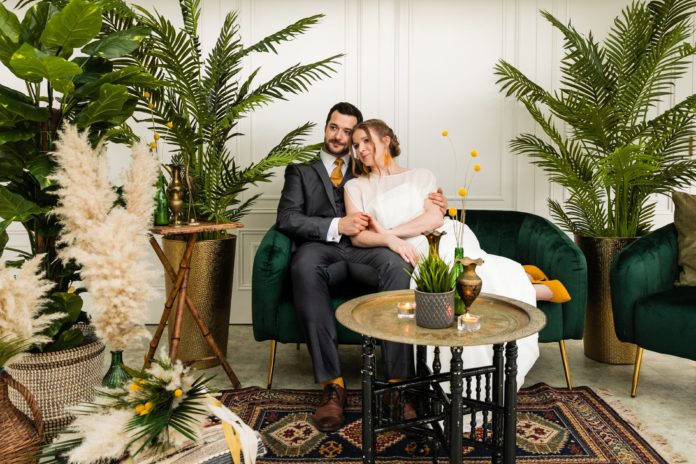To kick off our case study series we asked one of our contributors to share some insights into how she is leading her business, a wedding venue, on an ambitious journey to net zero. Here are some snippets from our conversation with Fleur Record Smith from Hayne House.
What were your motivations to making your business more sustainable?
Weddings are an opportunity for large celebrations but can also have huge environmental impacts. According to the Sustainable Wedding Alliance, the average wedding emits 14.5 tons CO2e. At least half of these could be reduced by making sensible, considered choices. Imagine, if we could reduce all wedding emissions by half… the potential saving is the equivalent to taking 866,847 cars off the road for a year![1] At Hayne House, we believe that as a business we should take responsibility for the environmental impact of the weddings we host. By working in collaboration with our colleagues in the industry, we want to bring change.
The business case is clear too. We asked ourselves, how long will it be until our customers start thinking about their wedding day’s impact on the environment?
This could translate into couples downscaling their day by moving away from certain products or services or cutting down on guest numbers for example. This would have a detrimental effect on business.
It became apparent to us that if our industry wants to thrive, sustainability needs to be at its core. Couples should be able to enjoy the big celebrations they dream of but without the huge environmental impact.
Did you have to capture much data on your environmental impacts and how did you find the data collection process?
When we signed up to the United Nations Race to Zero Campaign in January 2021 the whole concept of net-zero was not clear to us. There was very little support out there at the time for SMEs.
So we put one of our team members in charge of calculating our carbon emissions. This involved going through our bills and invoices to gather the data. We were surprised, once we had found some guidance on the calculation metrics, how easy it was to measure our Scope 1 and Scope 2 emissions. Scope 3 is more complex and still a work in progress. However we have recognized the areas that need addressing and have started to put in place metrics to capture and measure data. This will take time.
What have been the biggest challenges to date?
As expected, we have faced several challenges and anticipate having many more to overcome on the way! Here are some of the main challenges we have faced in the past 12 months:
Procurement
Whilst there are many sustainable products and services available, we could not find a “one-stop shop” wholesaler suitable for our needs as a small business. We had to thoroughly research sustainable alternatives for each product and developed a new supplier network. This has turned into a real positive. We now get most of our consumables directly from small, local businesses and farms. We also had to explore different types of packaging types and sizes that would meet our competing needs for shelf life, storage capacity and ease of use which took some time.
Supplier network
One of our biggest challenges is with our suppliers and broader networks. We have found that amongst SMEs very few have a sustainability strategy in place. Therefore sourcing from truly green suppliers is still very difficult. It has however become apparent that many of them do want to be more sustainable so part of our work is now to start conversations with them. We also want to use the venue to facilitate exchanges between suppliers so that we can drive change together.
Changing behaviour amongst our customers
We can’t achieve our targets if we don’t have support from our customers and unfortunately our industry remains driven by consumption and waste. To tackle this, we are working at an industry level alongside the Sustainable Wedding Alliance. We also incentivise our clients through reward schemes by offering prizes if they take specific steps.
Keeping on top of standards on the ground
Within a few weeks of the wedding season kicking off, we became aware that there was a gap between our sustainability “plan” and what was happening on the ground. This was especially the case when it came to waste management. We quickly had to take action to ensure that our processes were strengthened. We realised that the “eco team” needed to relentlessly monitor and track on the ground, as well as reinforce our messaging. The system is still not perfect, but we are continually reviewing and refining it.
What were the quick wins ?
Our staff’s support and enthusiasm! We had a hard time during the pandemic and were shut for nearly a year when we decided to join the United Nations Race to Zero in January 2021. Signing up for the campaign was something positive to focus on for our team, who were just like us, already interested in the topic. The team’s engagement and input has been phenomenal. We have embarked on this journey together and we feel that we are able to bring our personal values into our day to day by making a difference.
On a practical note, there are some quick and easy steps that we took which made an instant and sizeable difference to our emissions. For example switching to LED lighting and switching to a 100% renewable energy supplier.
What has made the biggest difference?
Taking the time to assess and review our emissions is what has really enabled us to take planned and targeted actions.
Once we had an understanding of the sources of our emissions, we were able to strategically review our business. This includes our supply chains, procurement and behaviour change. From there we were able to set clear and measured targets. Having a plan laid out over time made the whole process seem a lot less overwhelming.
What have the benefits been?
Transitioning our business to a more sustainable one has brought many benefits, such as:
- Strengthening our links with our supply chain. We now have a much more local and more sustainable supply chain, and work with more like-minded businesses.
- We gained an industry recognised accreditation through the Sustainable Wedding Alliance.
- Improving our energy efficiency. This will lead to long term costs savings and make a huge difference to our operational costs.
- More environmentally minded couples have contacted us, so we are attracting new business.
What are the costs of action and implementation?
It is true that making sustainable choices can come at a cost. Investments in our infrastructure will also be necessary. But the long-term benefits and cost savings in our opinion will outweigh these.
In terms of procurement, some consumables come at a premium but buying in bulk and using refillables has also saved costs.
Replacing all our light bulbs to LED was a small initial outlay. Switching to a 100% green energy supplier has come at a cost, around 25% higher. However, we felt that the immediate gain in emissions reduction made it worthwhile.
We also have larger investments that we are planning over time to make our buildings more efficient and to cut down our waste. There are some government grants available which help to fund some projects. By modernising the buildings we are making the business more resilient to rising energy costs and by tackling waste we will reduce our waste costs. Again, we believe these investments will pay back in the medium to long term.
What’s next?
Where to start? We’re only at the beginning!
- In terms of improving our premises, this winter we are installing a heat pump in the orangery. This will bring the heating emissions of our main reception building to virtually nil. After that our longer-term project is to make the old country house which is used for accommodation more energy efficient.
- Working with our customers and our suppliers to tackle our “scope 3” emissions. We understand that we can’t achieve our own net zero targets alone, so we have a lot to do to drive change.
With have workshops and networking events planned for our suppliers we hope we can raise awareness and share best practices.
- We will also continue to take action at an industry level by supporting specific campaigns and working closely with the Sustainable Wedding Alliance.
[1] https://sustainableweddingalliance.com/welcome/




